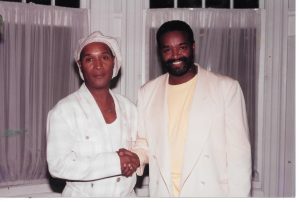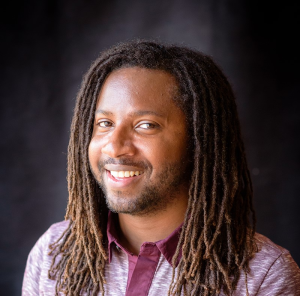Black Voice News
‘We’re Fighting For Our Lives’: Patients Protest Sky-High Insulin Prices
BLACK VOICE NEWS — The cost of insulin nearly tripled from 2002 to 2013 and has doubled again since then.
By Bram Sable-Smith
Angela Lautner knew her thirst was unusual, even for someone directing airplanes, outside in the Memphis summer heat.
“We had coolers of Gatorade and water for people to always have access to,” Lautner recalled of her job as a ground services agent. “But the amount of thirst that I felt was just incredible.”
She had no appetite and she lost an unusual amount of weight. Then after a trip to the emergency room, Lautner, who was 22, was diagnosed with Type 1 diabetes. The diagnosis was life-changing.
To start, it meant that for the rest of her life she would require insulin injections every day to stay alive. Unlike Type 2 diabetes, which can sometimes be controlled by diet, people with Type 1 diabetes need daily insulin injections to regulate their blood sugar.
Lautner’s diagnosis also meant she was no longer allowed to become a commercial airline pilot in the U.S. — a lifelong dream that she was training for in flight school at the time.
“I cried harder over losing my dream to fly than I did at the diagnosis of Type 1 diabetes,” Lautner said.
But after 18 years living with diabetes, Lautner now says the hardest thing about the diagnosis is accessing insulin — the expensive drug she needs to keep her alive. She has had to borrow money from her parents to pay for insurance; she has spent hours on the phone with drug companies; she has switched brands of insulin to save costs; and she even moved to a new state, Kentucky, with a more generous Medicaid plan.
Last year, Lautner noticed other people with Type 1 diabetes tweeting similar stories under the hashtag #Insulin4All. She read the stories of Shane Patrick Boyle and Alec Raeshawn Smith, two men who died because they could not afford their insulin. It was an epiphany.
“I thought, ‘My goodness, there’s more people than me. I’m not the only one out here,’” she said.
Since then, Lautner has joined a group of consumer activists, people who need insulin to live and are angry about the sky-high prices. They are putting pressure on the three main companies that make insulin: Sanofi of France, Novo Nordisk of Denmark and Eli Lilly and Co. in the U.S.
Taking On The Drugmakers
The cost of insulin nearly tripled from 2002 to 2013 and has doubled again since then. The list price is over $300 for a single vial of medicine, and most people with Type 1 diabetes need multiple vials every month to live. That cost is typically lower with insurance or with discount programs. Still, for some people the price is unmanageable.
There’s been some action by lawmakers on the issue. In October, Minnesota’s attorney general sued insulin manufacturers alleging price gouging, and a bipartisan caucus in the U.S. Congress issued a report in November urging action to bring insulin prices down.
But prices are still going up, so consumer activists like Lautner are taking things into their own hands.
Nonprofit group T1International, which advocates for Type 1 diabetes around the world, with a particular focus on insulin prices, has started holding rallies outside the Indianapolis headquarters of pharmaceutical giant Eli Lilly and Co.
Lautner joined more than 70 people who came together to demonstrate there in September. They were asking for three things: transparency about how much it costs to make a vial of insulin and how much profit comes from each vial, and a commitment from the company to lower the list price of insulin.
Protesters hailed from at least 12 states, mainly Ohio, Illinois, Indiana and Kentucky, but also from as far away as New York. Lautner, who now lives outside Cincinnati, rented a school bus with a dozen others to make the 112-mile trip.
“Insulin is kind of the face of the drug pricing crisis in America,” said Elizabeth Pfiester, founder of T1International who has Type 1 diabetes herself. “We literally die without it,” she said. “We’re fighting for our lives.”
This was the third time the group had protested at Eli Lilly headquarters. Last fall, when the group held its first protest there, Pfiester said, it was “the first time where people living with Type 1 were able to physically stand and show that people are angry enough to come out.”
Eli Lilly declined a request for an interview, but in statement a spokesperson said, “We understand why people are making their voices heard.”
Protesting is one arm of their advocacy efforts; the group is also lobbying at the state and national level, and conducting online awareness-raising campaigns under the hashtag #Insulin4All.
Advocacy At The State Level
Last spring, the fight got even more personal for Angela Lautner. She got a letter from her insurance company saying they were no longer going to pay for the insulin she was taking. They wanted to switch her to a different brand.
Most people with Type 1 diabetes use two types of insulin: short-acting insulin to counteract the carbohydrates consumed with meals, and long-acting insulin to keep blood sugar stable throughout the day.
Lautner has found that the long-lasting insulin brand Lantus works best with her body; it keeps her blood sugars low, but not so low that she becomes dangerously hypoglycemic, risking death. But her insurer was dropping its coverage of Lantus in favor of a different long-lasting insulin, Basaglar.
“The problem that I immediately saw was that had not worked for my body,” Lautner said. “So I go into my doctor’s office with this letter and I’m like, ‘What am I going to do?’”
Lautner’s doctor connected her to Sanofi’s drug discount program, where she was able to get a month’s supply of Lantus for a couple of hundred dollars. So she decided to pay for the insulin herself.
“I’m fortunate enough to have an emergency fund,” Lautner said.
But she knows others aren’t so lucky.
This year, Lautner organized her own group of diabetes activists in Kentucky, Ohio and Indiana, called KOI Insulin4All. They’ve met with legislators in all three states about establishing emergency insulin prescription refills and about making the cost of insulin more transparent.
There are similar groups starting up in Oklahoma, Pennsylvania, Minnesota and Illinois. In November, activists protested outside the Cambridge, Mass., office of Sanofi. All of them are pushing for the same thing — to make the voices of people with diabetes heard.
This story is part of a reporting partnership with NPR.
This article originally appeared in Black Voice News.

African American News & Issues
Geoffrey’s Inner Circle Not included in Funding Support
We will ultimately be successful in our efforts to reach the goal of our fundraising campaign but will also ensure that the native Oakland community of African Americans will receive equal assistance and opportunity in this city.

Publisher’s note by Paul Cobb: Several years ago when writer MarvinX Jackmon and I asked Mayor Libby Schaaf and Councilmember Lynette Gibson McElhaney to name the downtown business district in honor of the historic Black achievements, Black Newspaper, Black Businesses, Art Galleries, Black Museum, Government Buildings, Arts and Entertainment venues, I asked the Mayor to make sure that Geoffrey’s Inner Circle would receive the same financial support and grants that the Fox Theatre and the Oakland Auditorium were receiving. I reminded her how I as the former director of OCCUR, had led a group of historical preservationists to save the Fox from a demolition wrecking ball, she said she liked the Malonga Arts Complex instead. We at the Oakland Post support Geoffrey’s Go Fund Me appeal https://gofund.me/b2541419 with a $1,000.00 donation and my wife Gay Plair Cobb and I urge others to join us either in-kind or with at least the donation of a “Tubman” ($20.00 bill). Geoffrey’s ironically was the original home of Oakland’s white power structure. (We have published a photo below of how those White wealthy leaders often met and entertained themselves by adorning themselves in Black Face at the former Athenian Nile Club ( now Geoffrey’s). And now that the same establishment is represented by the face of a Black man, his establishment is being whitewashed with neglect.
The Post has asked Mr. Pete to give his own opinion below.
Paul Mooney appeared at Geoffrey’s Inner Circle some 30 or more times over the years. His platform and message were always used to shed a light on the grave racial disparity and economic injustice that has, whether acknowledged or not, plagued this country since its inception. This racially aggressive ideology has also had its tangles in our dear city of Oakland. A disparity study illustrated by Dr. Eleanor Ramsey highlighted the glaring absence of African Americans in the city’s landscape of budgeted allotments for professional services, labor construction and city development.

Former entertainer Paul Mooney often performed at Geoffrey’s urging America to face-up to White racism
While I applaud Yoshi’s Oakland for reaching their goal in their most recent Go Fund Me efforts, it should be noted that Yoshi’s also received $5 million dollars in assistance from both the City and Port of Oakland to open a jazz entertainment venue at Jack London Square. Geoffrey’s Inner Circle, a live entertainment venue that began at Jack London Square, has been operating for 30 years. This offer was not extended to expand GIC or renovate, nor was it offered to any other Black Owned Business in the entertainment genre in Oakland.
The Fox Oakland was $50 million dollars over budget for its renovation project and most recently left the City of Oakland with a $78 million cost overrun.
When an African American Development Firm entered a bid on the Oakland Auditorium/ Kaiser Center, the city gave a white developer the contract and $12 million dollars in naming rights. This deal in its origin should not have had any monetary exchange whatsoever, naming rights included. The aforementioned developer has additionally secured a 99-year lease that will cost him a hefty $1 dollar. He will also receive tax credits to the tune of a $20-$40-million-dollars in subsidies. Go fund me has a different ring to it if you are non-black and vending with the City of Oakland it seems.
We will ultimately be successful in our efforts to reach the goal of our fundraising campaign but will also ensure that the native Oakland community of African Americans will receive equal assistance and opportunity in this city.
Thank you in advance for your support!
Geoffrey Pete
GoFundMe
Bay Area
Holy Names University Celebrates New Teachers Completing Credentials
“I know very deeply what it means to be a teacher at any time but especially this past year. We wanted to do something special, and maybe this is starting a trend, to acknowledge all of our credential program completers.”

Holy Names University’s School of Education held a Zoom celebration at the end of the school year on May 28 to recognize eight new teachers who completed their teaching credentials, successfully finishing their rigorous training in the midst of an extremely challenging pandemic year.
The credential completers were honored by Dr. Kimberly Mayfield, dean of the School of Education, who emphasized the humanistic and nurturing approach to teaching that is the hallmark of Holy Names.
Reflecting on the principles that motivate the HNU staff, she said, “We train our candidates to be effective no matter what the setting is. Although this (year’s conditions) were unique, our candidates were expertly prepared for it.”
“I know very deeply what it means to be a teacher at any time but especially this past year. We wanted to do something special, and maybe this is starting a trend, to acknowledge all of our credential program completers.”
Mayfield explained that education and Oakland schools are a profound part of who she is. She is herself a former Oakland teacher; her mother was an Oakland teacher for many years; and her husband is currently an Oakland teacher.
“My hope and my charge for our candidates is not only to deliver the kind of education you’ve been trained to do but to really be sure that your classrooms are safe places for all students at your school,” Mayfield continued.
“When there are students who seem to be outliers and maybe don’t fit the picture of the school at large, that student fits the picture of success for you as a HNU graduate. Your classrooms become the safe places for all students, not just the students that are in your class or on your (rolls). That is the ethic of care that we’ve imparted.
“We are coming together in love and we want to recognize the good work that our HNU candidates have done.
She said that the Holy Names teachers are exceptional people. “When we do recruitment events, we always say we aren’t just training teachers to be teachers, we’re training teachers to be effective with our own children. When we look at who we want in the program, we are looking for candidates through those eyes. It’s a higher standard. Our relationship with you is forever.”
The eight Holy Names credential completers are:
- Todd Brewer, who is completing a special education credential. He teaches 8th grade at Impact Academy;

Todd Brewer
- Mason Brown, who is completing his single subject in science. He teaches physics for 10th, 11th and 12th graders at East Bay Innovation Academy;

Mason Brown
- Angela Calderon, who is completing her special education credential. She has been teaching special education at Richmond High School;

Angela Calderon
- Jaron Epstein, who is completing a special education credential. He has been teaching 6th-8th grade in a special day class at West Oakland Middle School;

Jaron Epstein
- Alexander Niuatoa, who is earning a single subject physical education credential. He teaches 7th and 8th graders at Winton Middle School and 10th grade at Hayward High School.

Alexander Niuatoa
- Erica Nurse, who is receiving her multiple subjects credential. She has been teaching second grade at Tolenas Elementary School in Fairfield and gives private music instruction in Vallejo.

Erica Nurse
- Shazmine Randle, who is earning a special education credential. She teaches 6th through 8th graders at Creekside Middle School.

Shazmine Randle
- Mariya Snazina is earning a world languages credential. She teaches French at Castro Valley High School.

Mariya Snazina
Each of the credential completers who attended the celebration will receive a $200 gift card, courtesy of a donation by the Teel Family Foundation, to help them buy supplies for their classrooms for the new school year.
Mayfield ended the ceremony by remembering the legacy of “really great educators who have gone before you: Dr. Fred Ellis, Margie Mayfield and Sylvester Hodges.”
“I want you to know that their energy is with you and supporting you as you go out and do really great work,” she said.
Black Voice News
BOE Member Malia Cohen Raises Red Flag on Bank-Breaking Prop 19 Tax Costs
“The challenge is that it was voted upon and the election has been certified. So, it’s the law,” Cohen said during a virtual media news briefing with reporters from across the state on January 29 organized by California Black Media.

Malia M. Cohen, the only African American member of the California Board of Equalization (BOE), has some critical concerns about the cost homeowners will have to bear because of Proposition 19, a constitutional amendment that took effect on Dec. 16, 2020.
Cohen, who represents 10 million Californians in 23 counties on the board, is concerned with how Prop. 19 will affect Black and other minority homeowners across California. The BOE is the commission responsible for implementing the law.
“The challenge is that it was voted upon and the election has been certified. So, it’s the law,” Cohen said during a virtual media news briefing with reporters from across the state on January 29 organized by California Black Media.
In her commentary, Cohen discussed the ways the law will impact all property owners.
“It not only affects our respective Black communities,” she told the reporters. “It affects all homeowners and property owners in the state of California. When people wake up there is going to be a massive coalition (to fight it) — possibly an uprising. People need to know what the real deal is.”
Cohen said she is planning other events similar to the news briefing she had with CBM. There, residents of California will begin to hear about “the first steps” they can take to become educated about how Prop.19 will hit their bottom lines. This is something she feels was not adequately explained to voters when the referendum was placed on the ballot last November.
On Nov. 3, 2020, California voters approved Prop. 19, the “Home Protection for Seniors, Severely Disabled, Families, and Victims of Wildfire or Natural Disasters Act.”
Although Prop. 19 was enacted in December, Cohen warns that a critical part of the legislation will take effect on February 16. Until that date, the state currently allows tax breaks for parent-child transfers. When parents give or sell real property to their children (or perhaps, grandchildren), that heir continues to pay property taxes at the same rate assessed on the home value as the parent.
After February 16, Prop. 19 will eradicate the parent-child exclusion. Then, parents would still be able to transfer their house to a child, and the child may keep the parent’s assessed value. But the Prop. 19 law has added one critical condition: the child must move into the residence and make the property his or her own primary residence. If not, the property will be reassessed at what the current tax cost is for the home at that time.
Cohen discussed the immediate property tax implications and how it might impede property owners’ intentions to create generational wealth by transferring their personal residence and other property they own to their children as part of their estate planning.
BOE Tax Counsel Richard Moon also participated in the briefing.
“What is required is that a child moving into the home must file a homeowner exemption and that needs to be done within a year of the transfer date,” Moon said. “The child has one year to move into the family home and maintain that family home in order to keep the exclusion. But if they move out after three years, the property would be assessed at that point.”
Rates of Black homeownership in California and across the country are still far below that of Whites and other minorities. Critics of the law say the fact that Prop. 19 could set up even more barriers to African Americans owning homes – and straddle struggling families with additional financial burdens – is problematic. About 2.2 million Black people reside in California, around 5.5% of the state’s population. According to the U.S. Census Bureau, the rate of white American homeownership is over 73%, while that of African Americans stands at 41%, Black Enterprise magazine reported in 2019.
According to data compiled by Lending Tree, the country’s leading online home loan marketplace, Los Angeles is one of the cities with the highest percentage of Black homeowners. Utah’s Salt Lake City, Texas’ San Antonio, Oregon’s Portland, and Northern California’s San Jose are also included on that list.
African Americans primarily generate wealth through homeownership and home inheritances, according to data included in the Urban Institute’s “2019 Black Homeownership Gap: Research Trends and Why Growing Gap Matters” report.
“Homeownership is currently the largest single source of wealth-building” among the Black population, the study stated. Between 2005 and 2008, over 240,000 African Americans lost their homes to foreclosure according to the Center for Responsible Lending.
“The financial crisis triggered a massive destruction of wealth for African Americans,” Alanna McCargo, co-director of the Urban Institute’s Housing Finance Policy Center told the Washington Post in 2019. “Wealth is inextricably linked to housing, and that wealth gap is evident in figures for Black-owned property in this country.”
The law, as it is written, would exclude from the term “purchase” and the phrase “change in ownership” for purposes of determining the “full cash value” of property in the purchase or transfer of a family home or family farm, for example.
Hardy Brown, Publisher Emeritus of the Black Voice News in Riverside says some of the spirit of Prop. 19 may have been positive. The state intended to provide financial cover for the mostly white Californians living in fire- and flood-prone parts of the state in the event disaster happens. But what it ends up doing, he argues, is decimate the wealth of Blacks and other minorities.
“It doesn’t help,” said Brown. “It might make a quick buck for campaign contributors or help the state to be a good neighbor to some people, but severely harms others in the process. What it really ends up doing is putting another law on the necks of Black people in the state of California. It will choke the breath right out of us.”
Under its constitutional mandate, the BOE oversees the assessment practices of the state’s 58 county assessors, who are charged with establishing values for approximately 13.6 million properties each year.
“We are not talking about $25 million palaces in Malibu. We are talking about humble homes. Middle-class homes,” Cohen said. “I live in the Bay View community (of San Francisco). We’re talking about Baldwin Hills of Los Angeles or Encanto in San Diego and other communities throughout California. Homes that were purchased for $100,000 decades ago that now have a market value of over $1 million. These homes were paid for through hard work and could be potentially lost.”
-

 Activism3 weeks ago
Activism3 weeks agoDesmond Gumbs — Visionary Founder, Mentor, and Builder of Opportunity
-

 Activism3 weeks ago
Activism3 weeks agoFamilies Across the U.S. Are Facing an ‘Affordability Crisis,’ Says United Way Bay Area
-

 Alameda County3 weeks ago
Alameda County3 weeks agoOakland Council Expands Citywide Security Cameras Despite Major Opposition
-

 Alameda County3 weeks ago
Alameda County3 weeks agoBling It On: Holiday Lights Brighten Dark Nights All Around the Bay
-

 Activism3 weeks ago
Activism3 weeks agoBlack Arts Movement Business District Named New Cultural District in California
-

 Activism3 weeks ago
Activism3 weeks agoLu Lu’s House is Not Just Toying Around with the Community
-

 Activism3 weeks ago
Activism3 weeks agoOakland Post: Week of December 17 – 23, 2025
-

 Activism2 weeks ago
Activism2 weeks agoFirst 5 Alameda County Distributes Over $8 Million in First Wave of Critical Relief Funds for Historically Underpaid Caregivers






















































